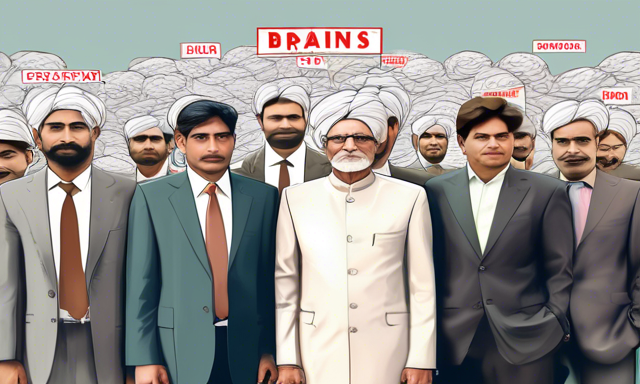Understanding Pakistan’s Middle-Class Exodus 🚀
The issue of skilled professionals leaving Pakistan is alarming, as they pursue opportunities beyond its borders. Amidst significant economic challenges, many professionals are compelled to seek better prospects abroad. The ongoing talent exodus raises critical questions about Pakistan’s future economic and political stability.
The Growing Crisis of Talent Departure 🇵🇰
Pakistan, home to over 230 million citizens, ranks as one of the world’s most populous nations. However, the prevailing sentiment among its residents reflects a deep sense of dissatisfaction. Reports illustrate a striking decline in optimism regarding Pakistan’s economic climate. The pressures of inflation have led to stagnant wage growth, exacerbating the feeling of despair among many citizens. For those in the middle class, financial strain has become increasingly burdensome.
- Current challenges include:
- Wages failing to keep pace with rapid inflation.
- Increased costs of living, with rent and utilities becoming unaffordable.
- Surging food prices, with essentials like milk costing more in local markets.
Dynamics of Economic Migration 📈
While economic migration has been a recurring theme in Pakistan’s history, the current situation underscores a significant shift. More individuals are not merely seeking better opportunities; they are desperately looking to escape dire circumstances. Veqar Islam, a tech entrepreneur based in Karachi, articulates a grim reality: the urgency to leave has escalated. Despite a prior commitment to develop his homeland, he, like many others, found himself confronting insurmountable challenges.
- Recent migrations reflect:
- A sharp increase in the issuance of U.S. visas to skilled Pakistani workers.
- Young professionals weighing options abroad against local job prospects.
Assessing Pakistan’s Economic Landscape 🏦
This year, Pakistan’s economic environment presents alarming statistics. Inflation rates for basic goods remain high, affecting essential items like rice and tea, which have more than doubled in price in two years. Moreover, the depreciation of the Pakistani rupee has rendered imports significantly more costly, further straining household budgets.
Many middle-class individuals now find that despite working long hours, they struggle to afford basic necessities. The reality for many has become that the combined incomes of a household are insufficient to cover basic expenses such as rent and fuel.
- Key economic obstacles include:
- Rising utility and living costs burdening families.
- Low wages, with only the top income earners able to live comfortably.
Political Agitation and Economic Challenges ⚖️
Pakistan’s challenges extend beyond economic strains. Political instability, exacerbated by the removal of former Prime Minister Imran Khan, has left a vacuum contributing to unrest. While the International Monetary Fund (IMF) has intervened to provide loans, these come with stringent reforms that stir public discontent. Issues such as inadequate tax revenue and high corporate tax rates further inhibit local investment and employment opportunities.
Professionals are increasingly vocal about how these economic pressures impact their quality of life. The threat of higher taxes and energy prices has heightened feelings of disenfranchisement among the populace.
Seeking Solutions and Retention Strategies 💡
With the ongoing brain drain, it has become crucial for Pakistani businesses to offer incentives that can retain talent. Strategies may include competitive compensation and career progression paths that encourage skilled professionals to stay or even return from abroad.
- Some companies are taking innovative steps:
- Offering bonuses and salaries in foreign currencies to combat currency devaluation.
- Fostering an international business presence that may create local job opportunities.
Hot Take: Navigating the Future of Pakistan 🇵🇰
The ongoing challenges facing Pakistan suggest that the path to stabilization is fraught with obstacles. While there are efforts to attract and retain talent, many remain skeptical about the immediate future. The potential for Pakistan’s professionals to innovate and contribute positively back home exists, but only if the underlying economic and political issues are addressed effectively. Building a sustainable environment that encourages skilled workers to remain may be the key to reversing the trend of brain drain.





 By
By
 By
By
 By
By

